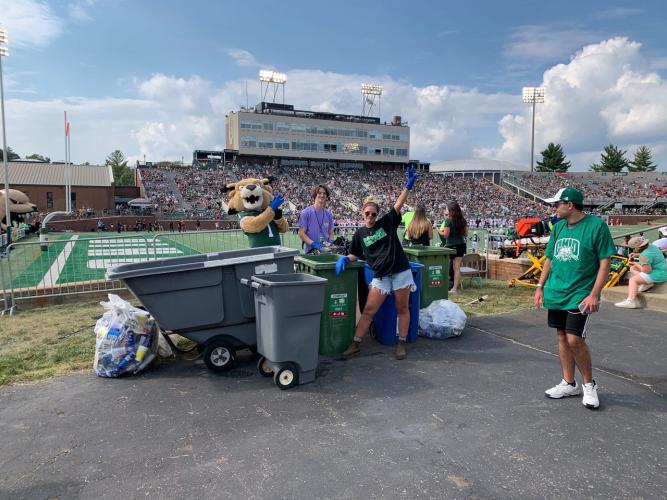

Ohio University has reclaimed the title of national champions for the highest diversion rate in the GameDay Recycling Challenge, an annual intercollegiate competition to achieve the highest waste diversion at major athletic events. After having been national GameDay champions in diversion for home football games in 2016 and home basketball games in 2017 and 2018, the university is proud to continue our nationally recognized ways and bring the trophy back to the Bobcat Nation.
The Bobcats secured their first place finish with a 92.9% recycling rate of all game and tailgating related materials created in and around Peden Stadium this season’s home football game vs Kent State. Top competitors and honorably mentioned opponents included LSU, Clemson and Ohio State, but OHIO was able to best even the toughest of competition by over 1%. Although one percent may seemingly be a minuscule advantage, many past showings have come down to tenths of a percentile which highlights the competitive and impressive nature of this feat.
This year, Ohio University Campus Recycling and Zero waste took steps to further improve accuracy and efficiency of waste diversion.
“GameDay Challenge is an excellent opportunity to build our recycling culture by engaging with thousands of fans all at the same time. This year, [Ohio University] is particularly proud of introducing an opt-in compost program to our tailgaters as well as setting up an in the stadium sorting station," said Andrew Ladd, Recycling and Zero Waste manager at OHIO.
During this GameDay Challenge in particular, Peden Stadium housed more than 15,000 spectators. Ensuring correct and consistent recycling rates from such a large crowd was made possible through effective communication/outreach, education, and proper system implementation and execution. Extensive efforts are made prior to the game and during the game to ensure recycling/sustainability excellence.
In days leading up to the event, recycling staff members set-up the stadium with bins/bags, as well as with sorting stations. During the game, team members and volunteers actively sort waste to ensure that it is correctly being disposed of. OHIO's Climate Ambassadors, a group of student volunteers who actively work to assist the university in achieving our Sustainability and Climate Action Plan goals fulfilled the role of 'bin goalie.' Bin goalies guide attendees on which bin to put their trash, recycling or compost and educate fans on importance of recycling. In addition to operational strategies, the communication and marketing team for campus recycling along with OHIO Athletics conduct extensive outreach and prepares overhead announcements, tutorial signage, and educational/informational video boards that can be seen/heard during game time.
"I like the fact that the work is hands and rewarding in that sense. I also like how we are interacting with the fans and really teaching what goes where. It has an immediate impact and makes a big difference. It’s actually really exciting," said Cass Fulk, Recycling and Zero Waste communication and marketing specialist at Ohio University
Combined with other participating universities, this fall season's competition alone reached nearly 7 million fans and led to 1.8 million pounds of waste being properly composted or recycled. With 50 registered universities nationwide (and growing), the potential for increase in future recycling rate success is promising and exciting.

